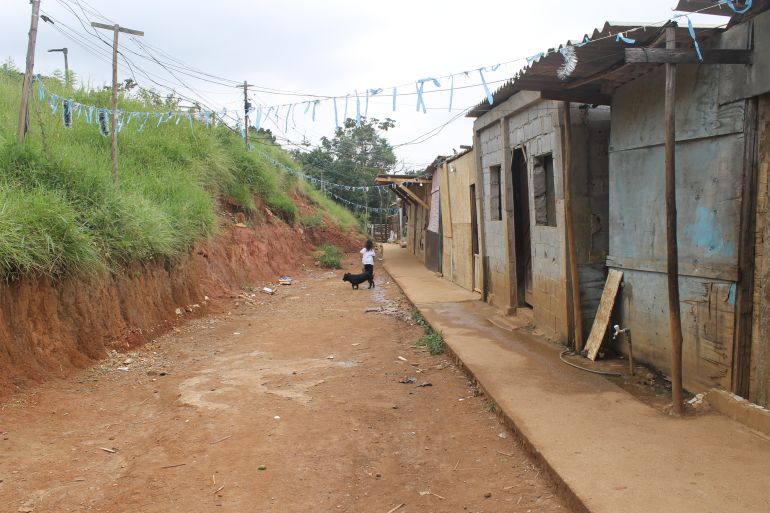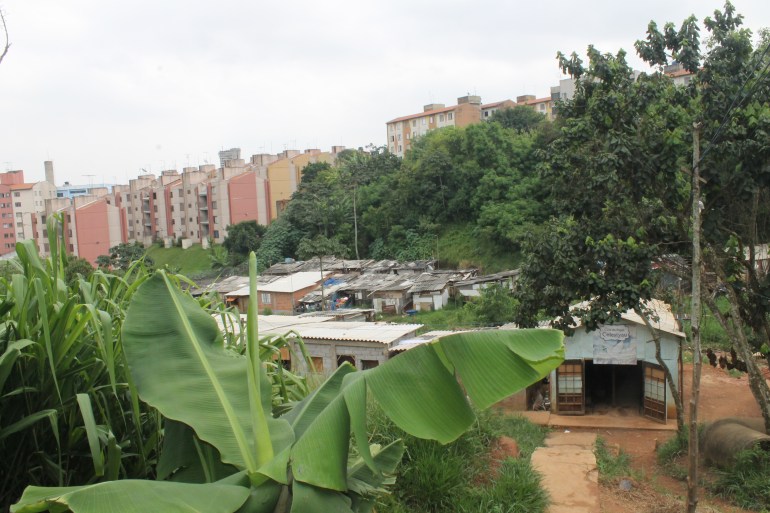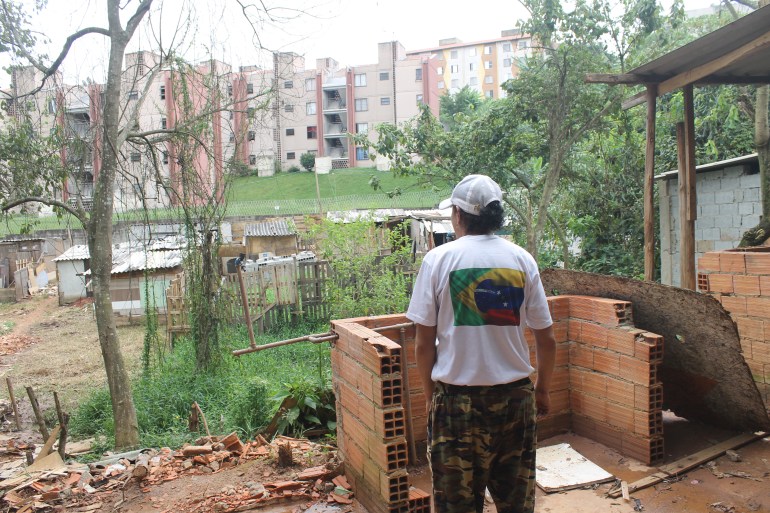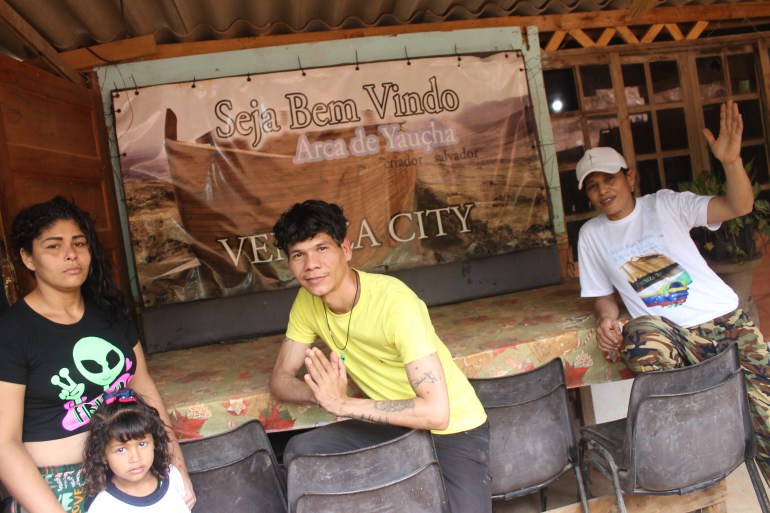Brazil: Venezuelan migrants find refuge in forest shantytown
An acute housing crisis in Sao Paulo is fuelling the rise of precarious settlements in environmentally protected areas.

Sao Paulo, Brazil – Nallelys Gonzalez decided she had to leave Venezuela in 2018. With the country facing economic and social collapse, the hospital where she worked started running out of medication, and food became increasingly scarce.
“The money that we earned wasn’t enough to buy food with,” she told Al Jazeera. “If we bought rice, we wouldn’t be able to buy chicken.”
Keep reading
list of 3 itemsLula government struggles to rein in deforestation in Brazil
To cut costs, a family lives in an informal occupation in Brazil
From her home city of Barcelona, a coastal metropolis about 300km (186 miles) east of Venezuela’s capital Caracas, she took a series of buses to Brazil’s northernmost state of Roraima, ground zero for Venezuelans seeking asylum in the country. She arrived with just $10.
After five months in Roraima, during which Gonzalez briefly slept in the street, lived at a United Nations refugee shelter and worked as a caregiver, the Brazilian government offered her family relocation thousands of kilometres south to Sao Paulo, South America’s economic powerhouse.
The move was part of a government-run relocation programme that has resettled more than 100,000 Venezuelans since its launch five years ago.
While Gonzalez and her family initially found work and housing in Sao Paulo, everything changed with the COVID-19 pandemic. Today, Gonzalez, along with her husband and two adult children, lives in an illegal squatters’ settlement known as “Veneza City”, home to around 30 other Venezuelan families.
Their makeshift wooden shacks are assembled inside one of the last remaining areas of Atlantic Forest in Sapopemba, a sprawling neighbourhood in the city’s east.
Soaring cost of living
Sao Paulo’s long-standing housing crisis, exacerbated by the pandemic and soaring cost of living, has pushed more and more families into precarious settlements like Veneza City in recent years.
Some of the shantytowns, including this one, have drawn the ire of local environmentalists, having been built in an officially protected area of richly biodiverse Atlantic Forest.
To clear room for properties, squatters need to deforest, sometimes tearing down trees that are centuries old. Experts say that high rents and economic hardships mean there will always be a cohort of willing occupants, while city hall lacks sufficient resources to tackle the scale of the problem.
Illegal forest occupations have also been leveraged to generate profits and launder money for criminal groups, including Brazil’s most powerful drug cartel, the First Capital Command (PCC), experts say.
“It’s a very lucrative real-estate business for organised crime,” environmentalist Gilberto Natalini, a former Sao Paulo city councillor, told Al Jazeera, citing more than 160 cases of “irregular occupations” in environmentally protected areas of Sao Paulo.

The phenomenon is different from organised housing movements that typically occupy private properties like buildings or plots of land, often abandoned or owing back taxes, to push for more affordable housing.
One case Natalini tracked in the city’s eastern district of Itaquera involved a gang “made up of [corrupt] inspectors, fraudsters and PCC criminals” who were “specialising in land-grabbing”, including by falsifying the deeds to public land. “There would not be this ease without public power, without the participation of corruption,” Natalini said.
Next to Veneza City, in the same protected forest area, stands another illegal occupation that locals say is linked to organised crime. A civil inquiry launched by Sao Paulo state prosecutors pointed to the previous use of “chainsaws” and “fire” to clear the area.
“The people that do this [illegal occupations] know that public power, that the state, is slow,” Sao Paulo city councillor Toninho Vespoli told Al Jazeera. “Organised crime takes the place of the state, because the state is absent.”
Antonio Fernando Pinheiro Pedro, the executive secretary for climate change at Sao Paulo city hall, told Al Jazeera that “criminal real-estate speculation” was the most severe issue facing the city’s environmentally protected areas today.
“There are occupations that are installed with urban infrastructure … there is investment of capital,” he said.
Across Sao Paulo’s protected areas, more than 30 specialised enforcement operations have been conducted in the past year to target these types of occupations, he added.

‘Licence to deforest’
Environmentalists fear that the problem could intensify in the coming months, after the Brazilian Congress recently voted in favour of legislation that critics say would weaken protections for the Atlantic Forest, one of the most endangered biomes in the world.
Approved by the lower chamber in March, the legislation – which would loosen permissions for forest clearance – still needs Senate approval to become law.
“It’s a licence to deforest; it’s one of the worst setbacks,” said Malu Ribeiro, public policy director of SOS Atlantic Forest, a Brazilian NGO.
Ribeiro told Al Jazeera that if passed, the new law would primarily benefit large-scale agribusinesses and real-estate ventures in the 17 states that house the Atlantic Forest, while organised crime groups involved with irregular occupations would also stand to gain from the weakening of protections.
Inside the squatters’ settlements, however, many are just trying to survive.
Amid signs of recent deforestation and land clearance, and with construction ongoing, Veneza City community leader Debora Maria dos Santos, who is Brazilian, showed Al Jazeera where the city’s environmental authorities had recently destroyed a community kitchen.

“They can’t destroy the homes if there are people inside,” she said.
Inside one of the makeshift wooden structures, Marioxy Palma sat drinking coffee.
With three of her children, she fled Venezuela in 2020 and spent months busing and hitchhiking across Colombia, Ecuador and Peru. She sends most of her monthly welfare grant, which amounts to 600 Brazilian reals ($120), to relatives back home.
As Palma’s pregnant teenage daughter served fried arepas, her mother told Al Jazeera that she did not regret the journey: “It’s much better here than in Venezuela.”